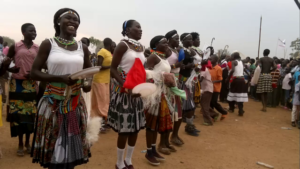Healthnet TPO: Improving Mental Health in South Sudan
 Decades of war have had a notable impact on mental health in South Sudan. Few resources are available to help those suffering from trauma and stigma deters people from seeking mental health assistance. Despite how dire the situation is, organizations are stepping up to improve mental health within the young nation.
Decades of war have had a notable impact on mental health in South Sudan. Few resources are available to help those suffering from trauma and stigma deters people from seeking mental health assistance. Despite how dire the situation is, organizations are stepping up to improve mental health within the young nation.
A History of War
Beginning in 1955, South Sudan has fought three civil wars. The first lasted from 1955 to 1972, the second from 1983 to 2005, and the third, starting after the nation’s independence in 2011, lasted from 2013 until 2018 when warring parties agreed to peace deals. The third civil war alone led to about 400,000 deaths and 4 million displacements.
Even after the agreement, violence remains common. Communities continue to fight “over land, cattle and grazing” and the fact that “political and military leaders” provide locals with weapons further exacerbates the violence. The violence between South Sudanese communities has led to “hundreds of thousands” of deaths and displacements across the country, adding to the nation’s collective trauma.
Mental Health in South Sudan
Information on mental health in South Sudan is limited, but South Sudan Health Cluster estimates indicate that about 5.1 million of the nation’s 11 million people are affected by the war. Specifically, 204,000 suffered severe mental health conditions and 1,020,000 experienced “mild to moderate mental health conditions.” These conditions include post-traumatic stress disorder (PTSD), anxiety and depression.
In 2015, the South Sudan Law Society and the United Nations Development Programme conducted a study that found that out of a group of 1,525 individuals across six states, about 41% met the criteria for PTSD. Despite how widespread mental illness is in the country, less than 1% of people are receiving the necessary treatment, according to the World Health Organization in 2017.
The Complex Mental Health Situation
There are only three practicing psychiatrists and 29 practicing psychologists in the entire country, all of whom are positioned in the capital city of Juba.
Furthermore, stigmas and taboos stand as barriers to addressing mental health in South Sudan. Many believe mental illness “runs in the family,” so if one member is diagnosed, then the rest become social outcasts. In fact, “Most communities believe in supernatural possession or punishment by higher powers, as opposed to accepting a mental illness diagnosis,” South Sudanese psychiatrist Dr. Atong Ayuel tells Al Jazeera. A possession is preferable to mental illness, so people seek assistance from religious institutions instead of mental health care practitioners.
Some believe faith is the cause of their recovery rather than treatment. Paradise Akaag Henry, a schizophrenic patient under Dr. Atong’s care tells Al Jazeera the reasons for her recovery. “First of all Jesus, and then Dr. Atong.”
Mental Health and Poverty
Mental illness and poverty are linked in several ways. Those living without treatment may not function well in their community and receive “limited employment opportunities,” pushing them further into poverty. Adolescent pregnancy and domestic violence rates tend to increase in circumstances of poverty.
In Glasgow, Scotland, a study found that 7.3% of 4-year-olds born into poverty showed “abnormal social, behavioral and emotional difficulties” compared to 4.1% for those not born into poverty. This prevalence increased by age 7 to 14.7% for impoverished children and 3.6% for wealthier children.
Also, the stresses from poverty, like long work hours, can affect cognitive function, which can lead to poor decision-making and increased susceptibility to mental illness.
A 2013 research study published in the journal Science found that the psychological burden created by poverty is the equivalent of “losing 13 IQ points.”
Action to Improve Mental Health in South Sudan
To fight mental illness in South Sudan, Médecins Sans Frontières (MSF), a nonprofit organization started in 1971 by medical professionals, “launched an emergency intervention in Tambura County in December 2021″ after large-scale violence plagued the area.
MSF Mental Health Activity Manager Ariadna Alexandra Pérez Gudiño and a group of four counselors from Tambura set up “community-based mental health services” across displacement camps. These services included “one-to-one counseling sessions, referral pathways for those in need of further treatment or medication and group psychosocial health sessions.”
Psychosocial group sessions included creative activities such as dancing, singing, creating jewelry and drawing. The psychosocial activities are particularly helpful as the sessions give residents an opportunity to process their trauma together. Between January and July 2022, MSF held “more than 11,500 individual and group” sessions across seven projects taking place throughout South Sudan. In June 2022, with the situation improving, MSF handed over its mental health programs to local health care workers.
Healthnet TPO
Healthnet TPO, established in 1992 by MSF, aims to “bridge the gap” between emergency aid and “long-term structural development.”
Its program, called Leaders of Peace, works to provide psychosocial and self-care services for women subjected to gender-based violence, alter society’s attitude toward women to improve gender equality and increase women’s participation in “leadership, decision-making and peacebuilding processes.”
The specifics include establishing community-based mental health programs across 50 communities in five South Sudanese states and placing 50 trained individuals in 50 women groups to manage gender-based violence cases, community engagement, mobilization, mental health advocacy and more. These individuals will also “strengthen different community groups” and advocate for mental health services and the passage of gender-based violence laws. The program will last from 2021 to 2025.
Through continued mental health efforts, the conflict-affected nation of South Sudan can move past its collective trauma and look to a brighter future.
– James Harrington
Photo: Wikimedia
